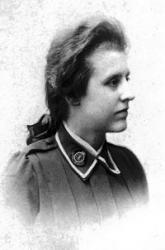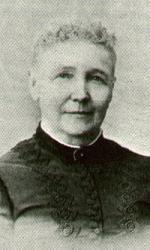Planning worship?
Check out our sister site, ZeteoSearch.org,
for 20+ additional resources related to your search.
- |
User Links
Person Results
Edwin George Monk
1819 - 1900 Person Name: Edwin George Monk, 1819-1909 Composer of "[Behold the Lamb of God] (Monk)" in The Hymn Book of the Anglican Church of Canada and the United Church of Canada
Edwin George Monk
August Crull

1845 - 1923 Person Name: A. Crull Author of "O Lamb of God, most blameless" in Hymn Book for the use of Evangelical Lutheran Schools and Congregations August Crull was born January 27, 1845 in Rostock, Germany, where his father, Hofrat Crull, was a lawyer. He was educated at the Gymnasium in Rostock, and at Concordia College in St. Louis and Fort Wayne where he graduated in 1862. His father died soon after he began studying at the Gymnasium. His mother then married Albert Friedrich Hoppe, who later became the editor of the St. Louis edition of Luther's Works. In 1865, Crull graduated from Concordia Seminary in St. Louis. He became assistant pastor at Trinity Church in Milwaukee and also served as Director of the Lutheran High School. Later he was pastor of the Lutheran Church in Grand Rapids, Michigan. From 1873 to 1915, he was professor of the German language and literature at Concordia College in Fort Wayne, Indiana. After his retirement he returned to Milwaukee, where he died on February 17, 1923. His first wife and three of his four children preceded him in death. His second wife, Katharina John, survived him by many years.
Crull was a distinguished hymnologist and translated many hymns that appeared in several Lutheran hymnals. He published a German grammar and edited a book of devotions, Das walte Gott, based on the writings of Dr. C.F.W. Walther. His project of translating Lutheran hymns so they would be accessible to American Lutherans bore its first fruits when he published a book of English hymns at the Norwegian Synod publishers in Decorah, in 1877.
--www.hymnsandcarolsofchristmas.com/
August Crull
Catherine Booth-Clibborn

1858 - 1955 Author of "At Thy Feet I Fall" in Timeless Truths Catherine Booth-Clibborn (Katie Booth) (18 September 1858 – 9 May 1955) was the oldest daughter of William and Catherine Booth. She was also known as "la Maréchale".
See also in:
Wikipedia
Catherine Booth-Clibborn
Harriet E. Jones

1823 - 1915 Person Name: Mrs. Harriet E. Jones Author of "O, Lamb of God" in Hymns New and Old, Revised Harriet E. Rice Jones, 1823-1915
Born: April 18, 1823, Pompey Hollow, Onondaga County, New York.
Died: 1915, Binghamton, New York.
Buried: Oran Community Church Cemetery, Pompey, Onondaga County, New York.
Daughter of Eleazer Rice, Jones lived in Onondaga County, New York. Her girlhood was spent on a farm, receiving what education the country schools and one term at high school could provide. She was always fond of reading, and was a great singer, with a clear ringing voice. On July 7, 1844, she married a son of Rev. Zenas Jones; her husband died in 1879. Her song writing career began when her poetry came to the attention of Dr. M. J. Munger, who asked if she could write some Sunday school hymns for him. She went on to write for Daniel Towner, J. C. Ewing, the Fillmore brothers, and others.
--hymntime.com/tch
Harriet E. Jones
Johann Christian Jacobi
1670 - 1750 Person Name: J. C. Jacobi Author of "O Lamb of God, our Savior" in A Hymn and Prayer-Book Jacobi, John Christian, a native of Germany, was born in 1670, and appointed Keeper of the Royal German Chapel, St. James's Palace, London, about 1708. He held that post for 42 years, and died Dec. 14, 1750. He was buried in the Church of St. Paul's, Covent Garden. His publications included :—
(1) A Collection of Divine Hymns, Translated from the High Dutch. Together with their Proper Tunes and Thorough Bass. London: Printed and Sold by J. Young, in St. Paul’s Churchyard; . . . 1720. This edition contains 15 hymns. Two years later this collection, with a few changes in the text and much enlarged, was republished as (2) Psalmodia Germanica; or a Specimen of Divine Hymns. Translated from the High Dutch. Together with their Proper Tunes and Thorough Bass. London: J. Young . 1722. This edition contained 62 hymns, of which 3 ("He reigns, the Lord our Saviour reigns"; "Is God withdrawing"? "Shepherds rejoice") and the first stanza of another ("Raise your devotion, mortal tongues," from "Hosannah to the Prince of Life") were taken from I. Watts. A second part was added in 1725, and was incorporated with the former part in 1732. London, G. Smith. After Jacobi's death the Psalmodia Germanica was republished, in 1765, by John Haberkorn, with a Supplement of 32 pieces.
[George Arthur Crawford, M.A.]
-- John Julian, Dictionary of Hymnology (1907)
Johann Christian Jacobi
Johann Walter
1496 - 1570 Person Name: Johann Walther Composer of "NUN KOMM" in The Cyber Hymnal Johann Walther (b. Kahla, Thuringia, Germany, 1496: d. Torgau, Germany, 1570) was one of the great early influences in Lutheran church music. At first he seemed destined to be primarily a court musician. A singer in the choir of the Elector of Saxony in the Torgau court in 1521, he became the court's music director in 1525. After the court orchestra was disbanded in 1530 and reconstituted by the town, Walther became cantor at the local school in 1534 and directed the music in several churches. He served the Elector of Saxony at the Dresden court from 1548 to 1554 and then retired in Torgau.
Walther met Martin Luther in 1525 and lived with him for three weeks to help in the preparation of Luther's German Mass. In 1524 Walther published the first edition of a collection of German hymns, Geystliche gesangk Buchleyn. This collection and several later hymnals compiled by Walther went through many later editions and made a permanent impact on Lutheran hymnody.
Bert Polman
================
Walther, Johann, was born in 1496 at a village near Cola (perhaps Kahla, or else Colleda, near Sachsenburg) in Thuringia. In 1524 we find him at Torgau, as bassist at the court of Friedrich the Wise, Elector of Saxony. The Elector Johann of Saxony made him "Sengermeister" (choirmaster) in 1526. When the Electoral orchestra (Kapelle) at Torgau was disbanded in 1530, it was reconstituted by the town, and in 1534 Walther was also appointed cantor (singing-master) to the school at Torgau. On the accession of the Elector Moritz of Saxony, in 1548, Walther went with him to Dresden as his Kapellmeister. He was pensioned by decree of Aug. 7, 1554, and soon after returned to Torgau, still retaining the title of "Sengermeister." He died at Torgau, perhaps on March 25, or at least before April 24, 1570. (Monatshefte für Musikgeschichte, 1871, p. 8, and 1878, p. 85; Archiv für Litteraturgeschichte, vol. xii., 1884, p. 185; Dr. Otto Taubert's Pflege der Musilz in Torgau, 1868, and his Gymnasial Singe-Chor zu Torgau, n.d., 1870, &c.)
Walther was more distinguished as a musician than as a hymnwriter. In 1524 he spent three weeks in Luther's house at Wittenberg, helping to adapt the old church music to the Lutheran services, and harmonising the tunes in five parts for the Geystliche gesangk Bucklyn, published at Wittenberg in 1524. He was also present in the Stadtkirche at Wittenberg, when, on Oct. 29, 1525, the service for the Holy Communion, as rearranged by Luther and himself, was first used in German. His hymns appeared mostly in his Das christlich Kinderlied D. Martini Lutheri, Erhalt uns Herr, &c. Auffs new in sechs Stimmen gesetzt, und rait etlichen schönen Christlichen Texten, Lateinischen und Teutschen Gesengen gemehrt, &c, Wittenberg.
Those of Walther's hymns which have passed into English are:—
i. Herzlich Lieb hab ich dich, mein Gott. Trinity Sunday. First published in 1566 as above, and thence in Wackernage, iii. p. 204, in 4 stanzas of 8 lines. Translated as:—
0 God, my Rock! my heart on Thee. This is a good translation of stanza i., iii., iv., by A. T. Russell, as No. 133 in his Psalms & Hymns, 1851.
ii. Herzlich thut mich erfreuen. Eternal Life. First published separately, in 33 stanzas, at Wittenberg, in 1552, entitled "A beautiful spiritual and Christian new miner's song, of the Last Day and Eternal Life" [Konigsberg Library]. Thence in Wackernagel, iii. p. 187, in 34 stanzas, stanza 33 being added from the Dresden reprint of 1557. It is set to the melody of a popular song on the Joys of Summer. It is a fresh and beautiful hymn, but is only partially available on account of its length. Translated as:—
1. Now fain my joyous heart would sing. This is a translation of stanza 1, 4, 5, 17, 33, 34, by Miss Winkworth, in her Lyra Germanica 2nd Ser., 1858, p. 223. Her translations of stanzas 1, 4, 5, were included in the English Presbyterian Psalms & Hymns, 1867, No. 325.
2. Soon will the heavenly Bridegroom come. This is by Dr. Kennedy, in his Hymn. Christanza, 1863, No. 1009, and follows the text of the Geistliche Lieder omitting stanza 16, 18, 13. It is repeated in the Laudes Domini, N. Y., 1884, &c.
3. The Bridegroom soon will call us. By Dr. M. Loy, from the Geistliche Lieder, but omitting stanzas 18, 13, as No. 24 in the Ohio Lutheran Hymnal, 1880. [Rev. James Mearns, M.A. ]
--Excerpts from John Julian, Dictionary of Hymnology (1907)
Johann Walter
Healey Willan
1880 - 1968 Person Name: Healey Willan, 1880- Arranger of "[O Christ, thou Lamb of God]" in Pilgrim Hymnal Healey Willan (b. Balham, London, England, October 12, 1880; d. Toronto, Ontario, February 16, 1968), theory teacher, composer and organist, was born into an Anglo-Catholic family in England and served several churches in the London area, becoming known especially for his adaptations of Gregorian chant to be able to be sung in English translation. In 1913 he moved to Canada where he led the theory department and was organist at the Toronto Conservatory of Music. He also was organist at St. Paul’s, Canada’s largest Anglican church, and after 1921 at the smaller Church of St. Mary Magdalene. By invitation, he composed an anthem for the coronation of Queen Elizabeth II, a singular honor for one not residing in England.
Emily Brink
Healey Willan
Laurene Highfield
1870 - 1970 Author of "Lamb of God" in Loyal Praise Laurene Highfield was born in Quincy, Illinois. She wrote about three hundred hymns and sacred songs, the libretto of one orotorio and several cantatas among other works.
NN
Laurene Highfield


 My Starred Hymns
My Starred Hymns


